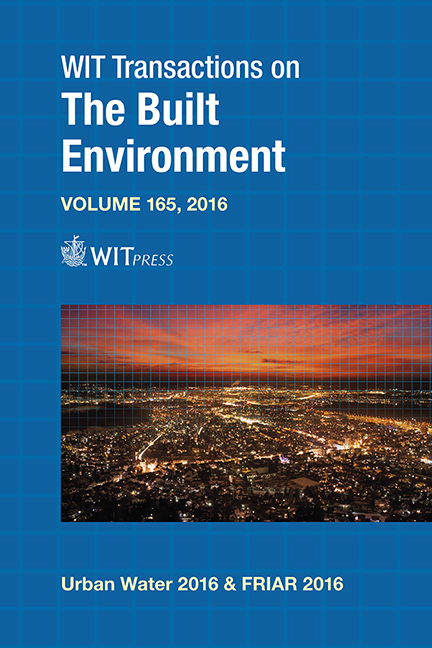Development Of Innovative Urban Water Efficiency Systems And A Four-legged Education Curriculum Addressing Water Reduction, Harvesting, Reuse, And Energy Generation Technologies
Price
Free (open access)
Transaction
Volume
165
Pages
10
Page Range
143 - 152
Published
2016
Size
3,142 kb
Paper DOI
10.2495/UW160131
Copyright
WIT Press
Author(s)
N. Chalfoun, O. Youssef
Abstract
Urbanization is no longer a gradual population shift, the world is undergoing major development and is utilizing technology and energy to increase the rate of construction. With changes in today’s society and culture, people are rapidly shifting from living in rural areas to urbanized environments. The world’s demand for energy and water has increased. Energy and water are fundamental components of life, they can no longer be considered separated. The building sector is changing the future of energy, accounting for almost 40% of energy consumption in the World. In addition, access to sufficient quantities of acceptable water quality is a basic need for human beings and a pre-requisite to sustain development and welfare. Human activities and consumption are also major contributors to climate change. Scientists have predicted that these effects will cause a rise in sea levels, more frequent floods, and droughts, which in return affects our initial water sources. The loss of water support below ground due to urban growth is becoming a geologic hazard, which may lead to land subsidence and Earth fissures being steadily encroached upon. Hence, mitigation through governmental decisions and policies as well as new technology and education will have the greatest impact on the building sector. This paper describes the development of innovative urban water efficiency systems and a four-legged education curriculum addressing: (1) water reduction, (2) water harvesting, (3) water reuse, and (4) water energy generation technologies. Focusing on the effective use of water to practice a more sustainable approach to new construction and urbanization, utilizing effective and efficient energy saving management in order to optimize building performance. The curriculum includes emphasis on environmental benefits that integrates water saving strategies to assessment of thermal conditions in and around spaces. Developed technologies and curricula materials include calculative methods, use of computer simulation, design monographs, and hands on inquiry based learning through laboratory sessions. Results and conclusion are included in the paper.
Keywords
urbanization, energy, water efficiency, water reduction, water harvesting, water reuse, water/energy generation, sustainable construction, building performance, curriculum, thermal comfort





